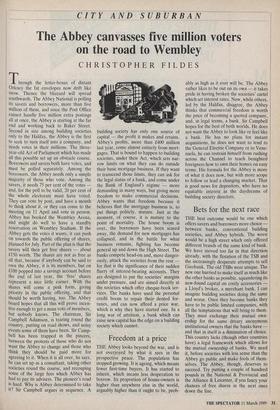CITY AND SUBURBAN
The Abbey canvasses five million voters on the road to Wembley
CHRISTOPHER FILDES
Through the letter-boxes of distant Orkney the fat envelopes now drift like snow. Thence the blizzard will spread southwards. The Abbey National is polling its savers and borrowers, more than five million of them, and since the Post Office cannot handle five million extra postings all at once, the Abbey is starting at the far end and working back to Baker Street. Second in size among building societies only to the Halifax, the Abbey is the first to seek to turn itself into a company, and needs votes in their millions. The three- year-old Act of Parliament which has made all this possible set up an obstacle course. Borrowers and savers both have votes, and must be polled separately. Among the borrowers, the Abbey needs only a simple majority of those who vote. Among the savers, it needs 75 per cent of the votes — and, for the poll to be valid, 20 per cent of the whole electorate must have voted. They can vote by post, and have a month to think about it, or they can come to the meeting on 11 April and vote in person. Abbey has booked the Wembley Arena, and might do well to have a standby reservation on Wembley Stadium. If the Abbey gets the votes it wants, it can push on towards the public offering of shares, Planned for July. Part of the plan is that the savers will then get free shares — about £150 worth. The shares are not as free as all that, because if anybody can be said to own the Abbey, it is its members, but on £100 popped into a savings account before the end of last year, the 'free' shares represent a nice little earner. With the shares will come a pink form, giving Priority in the public offering, and that should be worth having, too. The Abbey board hopes that all this will prove incen- tive enough to get a mass vote of members, but nobody knows. The chairman, Sir Campbell Adamson, is tearing round the country, putting on road shows, and noisy events some of them have been. Sir Camp- bell has been trapped in the pincers, between the protests of those who do not want the Abbey to change and those who think they should be paid more for agreeing to it. When it is all over, he says, he can set up as a consultant, taking other societies round the course, and recouping some of the large fees which Abbey has had to pay its advisers. The pioneer's road is hard. Why is Abbey determined to take It? Sir Campbell argues in sequence. A building society has only one source of capital — the profit it makeS. and retains. Abbey's profits, more than /400 million last year, come almost entirely from mort- gages. That is bound to happen to building societies, under their Act, which sets nar- row limits on what they can do outside their basic mortgage business. If they want to transcend those limits, they can ask for the legal status of a bank, and come under the Bank of England's regime L--- more demanding in many ways, but giving more freedom to make commercial decisions. Abbey wants that freedom because it believes that the mortgage business is, to put things politely, mature Just at the moment, of course, it is mature to the point of mortality. The house boom is over, the borrowers have been scared away, the demand for new mortgages has collapsed, and in the battle for what business remains, fighting has become general up and down the High Street. The banks compete head-on and, more danger- ously, attack the societies from the rear — for that is the significance of their sudden flurry of interest-bearing accounts. They are designed to put the societies' margins under pressure, and are aimed directly at the societies which offer cheque-book ser- vices. The banks have used the personal credit boom to repair their dented for- tunes, and can now afford a price war, which is why they have started one. In a long war of attrition, a bank which can raise new capital has the edge on a building society which cannot.


























































 Previous page
Previous page